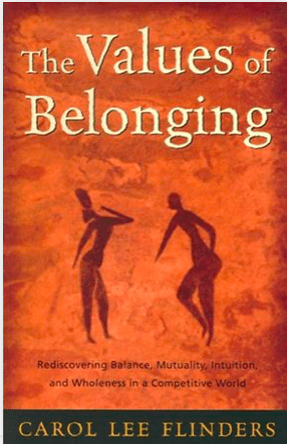
I am reading the most fascinating book right now and it is spurring all sorts of wonderings in my mind. The book is “The Values of Belonging” by Carol L. Flinders and every paragraph is an opening and a widening and a deepening of understanding.
The Values of Belonging breaks new ground by examining human value systems from the perspective of how we live, not our gender. “There is a way of being in the world that recoils from aggressiveness, cunning, and greed,” writes bestselling author Carol Lee Flinders. This way of being arose out of the relationships our hunter-gatherer ancestors had with the natural world, one another, and Spirit — relationships that are most acutely understood in terms of trust, inclusion, and mutual reciprocity. This society’s core values, which include intimate connection with the land, empathetic relationship with animals, self-restraint, balance, expressiveness, generosity, egalitarianism, playfulness, and nonviolent conflict resolution, are what Flinders calls the “values of Belonging.”
She contrasts the “values of belonging” with the “values of enterprise” that came about when humans began cultivating the land and domesticating animals. She speaks of how profoundly this affected the way we saw our place in the world – changing us from believing we were one integral part of something bigger to a culture of ownership, of dominion, of power.
I have pages of notes and sketches. I dream about it.
It has prompted me to start asking questions about Enough.
What is Enough?
What can I take part in without owning it?
Do I need to own things? Do I need to control them?
Part of the trouble with owning things is that, if we ascribe a certain level of value to them, we then start to fear losing them. And when we’re afraid of losing something, we often begin to believe that its value is greater than it once was. Then, we see anyone or anything that could potentially take those things away from us as a threat and this further severs us from a culture of belonging. Or, it means that we’ve created a new set of things to which we think we belong (and which belong to us) – inanimate objects or scraps of land, or even people, but this kind of belonging is ownership, not connection.
So many of the things that plague us today stem from a loss of connection. Depression and anxiety, relational aggression, climate change. These are all things that came about because of our desire to have, own, be in control of – these cultural values that make us believe we are safe and important. And they are tearing us apart. Owning land and cultivating it, drawing lines around “our” borders and rejecting those who we perceive to be a threat, these things might serve the short term purpose of feeding us and protecting us, but they are anathema to our long-term survival because no matter how hard we might try, we will never be separated from the natural world and each other. We are all intimately intertwined and, in fact, it is our biological imperative to live that way. Our brains are hard-wired to respond to connection by releasing hormones when we cuddle an animal, nurture our young, give or receive a hug. It is why, when we offer help to another person, we feel good about ourselves and when we walk in the woods our nervous systems calm down.
So how much is Enough?
How can we begin to return to each other and the natural world?
Can we integrate the values of belonging with the values of enterprise without destroying ourselves?
I hope so. I haven’t finished the book yet, but for now, I am asking the questions and spending time noticing how I feel when I imagine more connection and less dominion.


